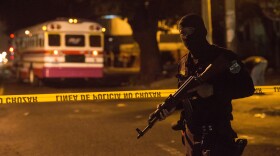
Kelly McEvers
Kelly McEvers is a two-time Peabody Award-winning journalist and former host of NPR's flagship newsmagazine, All Things Considered. She spent much of her career as an international correspondent, reporting from Asia, the former Soviet Union, and the Middle East. She is the creator and host of the acclaimed Embedded podcast, a documentary show that goes to hard places to make sense of the news. She began her career as a newspaper reporter in Chicago.
-
Chinese President Xi Jinping and President Obama agreed on at least one thing this week: They need to coordinate action to lower greenhouse gas emissions to combat climate change.
-
The Broad contemporary art museum opened in Los Angeles this weekend, and NPR explores how the museum's audio tour addresses the challenge of how talk to kids about contemporary art.
-
The reasons behind the bus shutdown aren't clear, but the results have been tragic: nine drivers assassinated and a city in turmoil.
-
Albuquerque Police have reached a settlement agreement with the Justice Department over use-of-force policies. The police have agreed to take steps to address issues that led to, what the Justice Department claims, is a pattern of unconstitutional uses of force.
-
The Iraqis, among many other Middle Easterners, believe they invented the kebab. The skewered meat dish appears as early as the 9th century in a book from the southern city of Basra called The Book of Misers.
-
Popular theory holds that after Mohammed Morsi's ouster, the power came back on and gas lines disappeared because Hosni Mubarak's entrenched "deep state" was deliberately undermining Morsi during his term. More likely, Egypt's large and immovable bureaucracy simply wasn't equipped to deal with the new leadership, which too quickly pushed its own agenda rather than a national one. Analysts say Egypt's experience is a lesson to countries around the region that even when you change the leadership, it's much harder to tackle the deep state that remains.
-
The accuracy of Al-Jazeera's reporting has come under criticism in the past, and now the network is taking a hit amid claims it slanted its coverage in favor of the Muslim Brotherhood during Egypt's recent political crisis. At stake, too, is the credibility of Al-Jazeera's main backer, Qatar.
-
The ouster of Egyptian President Mohammed Morsi has changed things for other Arabs living in the country. When a group falls from grace, so do those who are perceived to be its supporters. Under Muslim Brotherhood rule, Egypt was one of the few remaining safe havens for Syrians fleeing the war in their country. The political change in Egypt is putting Syrians in danger.
-
For the first time in modern history, Shiites are crossing borders to fight against the "evil ones," meaning Sunnis. As Hezbollah's Hassan Nasrallah has openly admitted, his men are leading battles in Syria, and Iraqi fighters stream in join them, Shiites back at home envision the coming of the hidden imam. They say all the signs in Syria point to the Mahdi's imminent appearance.
-
The last remaining areas of the embattled Syrian town of Qusair fell to government forces and fighters from the Lebanese Shiite militia Hezbollah over the weekend. The main concern now is what's happening to the civilians.



